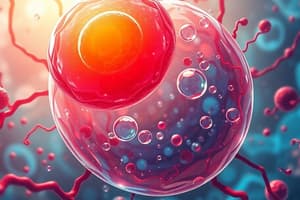Podcast
Questions and Answers
What critical role did the newly formed Ontario Cancer Institute play in Ernest McCulloch's research career?
What critical role did the newly formed Ontario Cancer Institute play in Ernest McCulloch's research career?
- It provided funding for his research on radiation experiments and their unexpected outcomes.
- It facilitated his collaboration with researchers in London, expanding the scope of his leukemia studies. (correct)
- It served as the primary location where he conducted the main body of his research into blood formation.
- It enabled him to focus on the mechanisms of human leukemia in the 1970s.
How did a specific event early in Ernest McCulloch's career significantly shape his research focus?
How did a specific event early in Ernest McCulloch's career significantly shape his research focus?
- His work at the Lister Institute led to an interest in regenerative medicine.
- His fellowship at Sunnybrook Hospital propelled him to study blood formation.
- A radiation experiment yielded an unexpected result, leading him to pursue new avenues of inquiry. (correct)
- His collaboration with Andrew Becker led him to focus on stem cell research.
In what specific area of study did James Till broaden his research interests later in his career?
In what specific area of study did James Till broaden his research interests later in his career?
- The mechanisms of human leukemia, shifting from his initial focus on physics.
- The intersection of research ethics, patient quality of life, and the role of the internet in patient advocacy.
- The development of new methods for radiation treatment in cancer therapy. (correct)
- The study of biophysics and its application radiation sensitivity of mouse bone marrow cells.
What contribution did Ernest McCulloch and James Till make to developmental biology?
What contribution did Ernest McCulloch and James Till make to developmental biology?
What was the primary focus of James Till's research before he began collaborating with Ernest McCulloch on stem cell research?
What was the primary focus of James Till's research before he began collaborating with Ernest McCulloch on stem cell research?
Which recognition did James Till receive as a testament to his standing within the Canadian scientific community?
Which recognition did James Till receive as a testament to his standing within the Canadian scientific community?
What was the subject of the seminal paper published by McCulloch and Till in 1961?
What was the subject of the seminal paper published by McCulloch and Till in 1961?
What impact did McCulloch and Till's stem cell research have on cancer treatment and regenerative medicine?
What impact did McCulloch and Till's stem cell research have on cancer treatment and regenerative medicine?
What motivated Ernest McCulloch to pursue a career in medical research?
What motivated Ernest McCulloch to pursue a career in medical research?
What recognition did McCulloch and Till jointly receive for their contributions to medical research?
What recognition did McCulloch and Till jointly receive for their contributions to medical research?
Flashcards
Ernest McCulloch
Ernest McCulloch
Hematologist who aimed to find a cure for leukemia and recognized a radiation experiment producing an odd result as something entirely new.
Departmental Head (McCulloch)
Departmental Head (McCulloch)
Hematology Head at Ontario Cancer Institute in 1957.
James Till
James Till
Physicist who helped make the extraordinary discovery of stem cells.
Pivotal Publication
Pivotal Publication
Signup and view all the flashcards
Leukemia Studies
Leukemia Studies
Signup and view all the flashcards
Return to Canada
Return to Canada
Signup and view all the flashcards
Seminal Paper
Seminal Paper
Signup and view all the flashcards
Adult Stem Cells
Adult Stem Cells
Signup and view all the flashcards
Study Notes
- Canadian Ernest McCulloch was a hematologist who wanted to find a cure for leukemia
- He recognized the odd results of a radiation experiment as something new
- McCulloch was born and raised in Toronto
- He studied medicine at Toronto University and qualified as a doctor in 1948
- He returned to Toronto after a period at the Lister Institute (a medical research charity in London, UK)
- He worked as a research fellow in pathology at Sunnybrook Hospital
- In 1957, he joined the newly created Ontario Cancer Institute, a research division of Princess Margaret Hospital
- He began researching blood formation
- McCulloch soon joined forces with James Till
- Their work on stem cells transformed cancer research and gave rise to regenerative medicine
- McCulloch was a key figure in Canadian medical research
- He served on many national and international advisory committees
Milestones - Ernest McCulloch
- Became Head of Hematology at the Ontario Cancer Institute in 1957
- Published stem cell research findings with Till and Andrew Becker in Nature in 1963
- Focused his stem cell research on analyzing the mechanisms of human leukemia in the 1970s
- Inducted into the Canadian Science and Engineering Hall of Fame in 2010 along with Till
Milestones - James Till
- Declined an assistant professorship at Yale in 1957, in favor of a post at the University of Toronto
- Published a paper on the "radiation sensitivity of mouse bone marrow cells" with McCulloch in 1961
- Became a Fellow of the Royal Society of Canada in 1969
- Presented with the Albert Lasker Award for Basic Medical Research in 2005, jointly with McCulloch
- Physicist James Till turned his attention to cancer research
- He and Ernest McCulloch made the discovery of stem cells while working on radiation treatment
- James Till studied physics at the University of Saskatchewan via scholarship
- He completed a PhD in biophysics at Yale University in 1957
- In 1958, he began work with McCulloch at the Ontario Cancer Institute
- Till's research interests expanded in relation to cancer treatment later in his career
- His studies included research ethics and patient quality of life, as well as the role of the internet in patient advocacy and support
- McCulloch and Till discovered that most bones of the human body contain unspecialized cells called adult stem cells
- These cells reside in the inner marrow, and are able to develop into any blood cell
Studying That Suits You
Use AI to generate personalized quizzes and flashcards to suit your learning preferences.
Description
Ernest McCulloch, a Canadian hematologist, sought a leukemia cure. His stem cell research, in collaboration with James Till, revolutionized cancer research and regenerative medicine. McCulloch was a significant figure in Canadian medical research.





